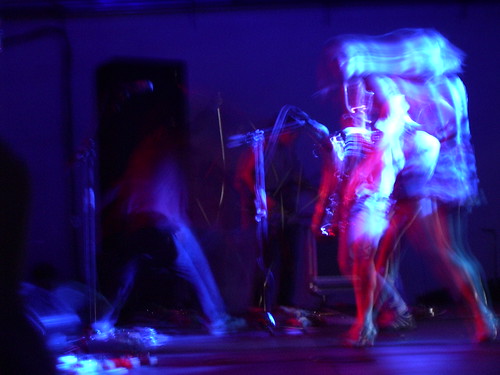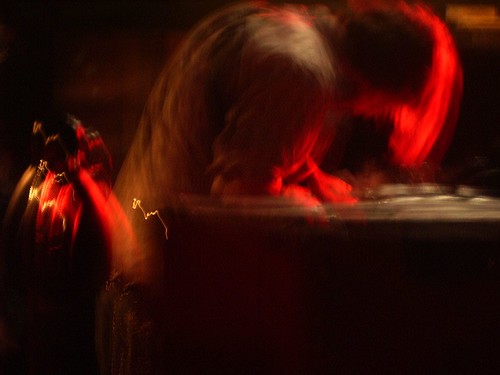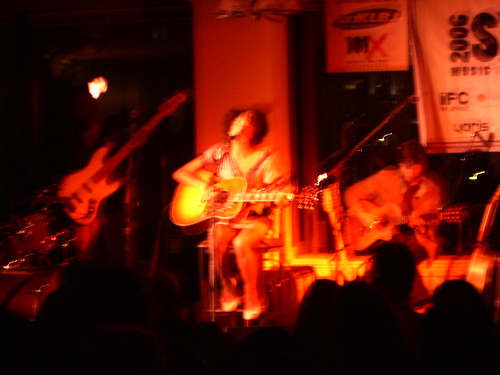
Photo: Pat Graham [from the Fugazi Live Series website]
“I would rather go into the studio and record a new band than throw a party to celebrate 20 years of Dischord.”
You’re too busy to celebrate?
“I celebrate by being busy.”
Ian MacKaye sits in the cramped, calmly-frenzied office which has served as the nerve-centre for Dischord Records for over two decades now, and throws on a sweater. It’s getting colder; a couple of days ago a hurricane tore through the city, and its been raining solidly for a day and a half now. Downtown, cops are preparing to crack the heads of protestors at the World Bank offices. “
It’s a lesson MacKaye put into practice back in 1980, when he and friend/bandmate Jeff Nelson started Dischord Records. Founded purely to release their band The Teen Idles’ EP, the label has gone on to define the evolving sound of DC. It stands as a powerful example of the potential of the underground, rejecting the more detestable practices of the mainstream music industry and doing things wholly on their own terms.
In many ways, Dischord is cast in MacKaye’s image, like Berry Gordy’s Motown or Russell Simmons’ Def Jam (Jeff Nelson remains crucial to the running of Dischord, but is somewhat more publicity-shy); like those pioneers, MacKaye’s passion and beliefs are at the core of the label’s every action. But he’s wary of taking credit for the label’s success and identity; his years as frontman for Minor Threat and Fugazi have made him target for erroneous accusations of egotism; as it is, he prefers to evade the role of label-figurehead, arguing (convincingly) that Dischord exists to “Honour the music. Without the bands or the music, there wouldn’t be a label.”
Despite this reluctance, MacKaye’s spirit pervades Dischord. “I was raised in a culture where you were supposed to question authority,” he says, at one point. “The situation right now in this world, and particularly in our two countries, shows that authority unchecked is madness, and what’s happening is absolutely reprehensible. Clearly, most of the people in this country were not raised in my house. If everyone in this country had been raised in my house, this would not be happening.”
This effortless liberalism, this questioning-spirit, this fearless sense of right and wrong put into practice lies at Dischord’s heart. It’s this spirit which has made Dischord perhaps the most important, and certainly the most consistently-thrilling punk-rock label of all time.
Ian MacKaye had loved rock’n’roll since he was a Hendrix-obsessed eleven year old, but the world of 70s dinosaur rock taught him rock’n’roll was for gods like Led Zeppelin, not ordinary people. But punk-rock, proselytising and democratising, drew him back to the fold.
Formed in 1979, The Teen Idles were too young to play nightclubs, so they rocked youth clubs and parties, until a tour of California introduced them to the custom of stamping underage kids’ hands with ‘X’s, allowing them entrance to clubs that served liquor, a practise they swiftly introduced to DC. “One lesson I learnt was, if you live in
Bad Brains, local hardcore legends who blended bullet-sharp thrash-punk with quaking, righteous dub-reggae, were a key influence. “They were the fastest, greatest band in the world,” says MacKaye, breathlessly.
When the Brains returned home broke, their gear stolen, after an aborted
The Teen Idles split after a year together. A warning tremor of DC’s oncoming hardcore earthquake, they’d been dismissed by local scenesters as ‘teenie punks’. Deciding to do something constructive with the $600 they’d amassed from their short career, they elected to release a posthumous EP.
Typically, the fact they had no idea how to achieve this aim didn’t discourage MacKaye and Nelson. Local record store owner Skip Groff hooked the boys up with a pressing plant, and soon the band were throwing their first ‘glue party’. “We did that for the first six Dischord releases. All of them. We hand cut and folded and glued every single one of them. By the end of it, that was probably about ten thousand records,” says MacKaye. “I loved it; that’s exactly how I like to spend my time, working with a bunch of people doing constructive things.”
By the time Dischord’s first release hit the stores, MacKaye and Nelson had formed Minor Threat. The four-piece revolutionised punk-rock, their politicised thrash focussing youthful anger into an electrifying rush of energy. Minor Threat’s success would galvanise the surrounding hardcore scene; soon, Dischord would release records by SOA, Government Issue, Scream, Deadline and Faith. Members of these bands would later play in acts as seminal as Black Flag, Jawbox, Nirvana and Fugazi.
DC’s scene was furious, incestuous and teeming. Energy, creativity and activism were the watchwords, and Dischord lay at its heart. As the label gathered steam, MacKaye remembers, “It seemed clear that all we wanted to do was put out our friends’ records, and that sort of was the root of what became the greater mission, to document the music of this particular community.”
As that mission unfolded, the label took shape. Releases were cheap – EPs were $2, LPs $5 (even now, Dischord CDs are only $8). Recording was done at Inner Ear, a rudimentary studio in the basement of Don Zientara, a producer some years older than his charges, but equally electrified by this noise. Two decades later, little has changed. “People thought from the very beginning that we were too idealistic, that we had a poor business model, that we were unrealistic,” says MacKaye, with deserved pride. “We’ve never had an unprofitable year. Ever.”
But the scene was dangerously turbulent. Like most of their contemporaries, Minor Threat barely lasted 2 fractious years. And increased violence at shows was further souring the scene. “It was like having these great picnics,” explains MacKaye, “Then suddenly a bunch of skinheads turn up at the picnic and start beating the shit out of people, and every time you have a picnic they show up.”
Fighting back proved no solution. “So we just started another picnic, with food they don’t like to eat. We started making music which didn’t appeal to Skinheads. Embrace, Rites Of Spring, they changed the course of events. Here’s something that’s real deep and meaningful that’s not gonna sound like Minor Threat.”
The era became known as Revolution Summer, signifying the transitory spirit in the air, and the newfound maturity of the scene. New bands eschewed the breakneck thrash of yore, embracing a broader musical palate, from the baroque stylings of Shudder To Think, to the impassioned scrawl of the phenomenal Rites Of Spring, featuring Guy Picciotto on vocals.
The latter band would later be credited with creating ‘emo-core’, but their tear-splattered angst anthems were lightyears beyond the tasteful college rock that passes for the genre now. “To hurt yourself playing guitar while falling around onstage is far more noble than to be sitting weeping to yourself somewhere,” poeticised Picciotto at the time.
When Rites Of Spring dissolved, Picciotto and bandmate Brendan Canty joined MacKaye and bass-player Joe Lally to form Fugazi, perhaps the quintessential Dischord group. Their passionate beliefs (tickets for shows never above $5, safety of kids at their gigs a priority) and their broad, ground-breaking punk-rock (embracing textures of dub reggae, abstract noise and funk along with taut rock’n’roll) have set the tone for a label that refused to be tied to any single place in time, avoiding the pitfalls which ultimately befell contemporaries like Greg Ginn’s SST label, or even Seattle’s Sub Pop.
The bands the label has worked with since have been similarly musically adventurous – Nation Of Ullysses’ insurrectionary rabble rousing, Slant 6’s noir-ish riot grrrl, Q And Not U’s jarring spazzcore. More startlingly, the label is now recording bands they didn’t know personally. “First we were just releasing our friends’ records. Then it was our friends’ new bands’ records. Then we started recording bands who’d grown up listening to Dischord Records,” marvels MacKaye.
MacKaye takes great pride in the fact that, since beginning preparations for Dischord’s Twentieth-anniversary box set in 1999 (released this month, two years late), Dischord has released albums by several new bands not featured on the compilation. A certain creative restlessness is apparent. Indeed, he’s at his most animated talking up The Black Eyes, newest arrivals to the imprint.
“Usually, I go to real small concerts, the kinda shows 30 people attend. I don’t really care about the bigger shows; I like gigs where new ideas are being presented, new variations on music are being put across by people who are sort of just coming to terms with their instruments. Because they don’t know how to do it they make it up as they go along, and that’s where you get really incredible improvisation.
“I’m not a nostalgic person,” he says, of the retrospective he’s releasing. “But without the bands, we wouldn’t be a label. And I feel, ultimately, the label is committed to honouring the music. I’m not trying to speak in high falutin’ terms, but music is crucial, a form of communication that predates language, despite the music industry’s attempts to make it just some trivial consumable.”
This reluctance to view music as a commercial commodity is both Dischord and MacKaye’s essence. Music is the glue that holds together the community he feels himself a part of, a community Dischord and the labels which have followed in its wake helped create and nurture. “I always loved the idea of being a street gang; I wanted to be in a crew, the sense of a family, a tribe. I desire to feel part of an extended family, I feel like I’ve achieved that. In most cities in the world I could find someone who would give me a dinner or something, because I’m involved with a community that I call punk rock, a community that will look after each other. I find it a very reassuring thing about human nature that people still feel connected, even if they’ve never met.
“Dischord employs five people, at reasonable wages, plus benefits. And we treat the people who work for us as our friends and our partners, as opposed to just our employees. It’s a humane reasonable business that is not purely driven by profit. This is a business model that clearly has worked. And it hasn’t made me rich with money, but it has made me richer, with life, than any other motherfucker.”
In a world where the corporate music industry is ever more divorced from the art and spirit of the music that is supposed to be its essence, that’s a lesson that shouldn’t ever be forgotten, and a truism that’ll cut you to your core, every time you spin something with that scrawled ‘Dischord’ motif planted on its label. Out Of Step With The World, motherfucker. Brilliantly so.




1 comment:
Howdy?...from Japan.
Somehow I made up links with my blogger friends lately, and also I added your music blog in it.
If you like, come over and browse others: somehow my blog's just like meltingpot now...I have no idea how others hit mine, actually.
And aye, there are full of unique people - guys/girls/students/etc...
And you're the 1st entry from UK :)
I like your unique writings 'bout music, too ♪
Post a Comment